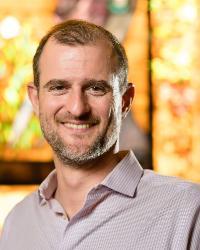November 19, 2019
This blog features stories about the Wheaton College Graduate School. In this story, Dr. Todd Wilson '98, M.A. 01, shares about his journey from Wheaton, to Cambridge, to founding the Center for Pastor Theologians.
 "The Scholar’s Head with the Shepherd’s Heart"
"The Scholar’s Head with the Shepherd’s Heart"
Dr. Todd Wilson is the Cofounder and President of the Center for Pastor Theologians (CPT). He received an B.A. in Philosophy from Wheaton College in 1998, an M.A. in Biblical Exegesis from the Wheaton College Graduate School in 2001, and a Ph.D. in New Testament in 2005. In this interview, he answered some questions about his journey from the academy, to the church, to his unique vocation as a pastor theologian today.
Q. You are a cofounder and the president of the Center for Pastor Theologians (CPT). Can you explain what the term “Pastor Theologian” means? How is it different from “Pastor” or “Theologian?”
"In general terms, a pastor theologian is someone who provide theological leadership to the life of the church as a local church pastor. We work with a threefold taxonomy to give a little more nuance to what we mean by pastor theologian. We talk about local theologians, popular theologians, and ecclesial theologians. The CPT has devoted most of our energies to cultivating the ecclesial theologian—this is the local church pastor who provides theological leadership, not simply to her own congregation, but to God’s ecclesia more broadly conceived."
Q. What was your inspiration for founding the CPT? How does Wheaton College fit into this journey?
"The CPT has two founders: myself and my colleague Gerald Hiestand. And each of us brought a slightly different source of inspiration to the founding of the CPT. For Gerald, it was being captured by the vision we see throughout church history of pastors as the leading theologians of the day. Gerald recognized that this was no longer the case. The leading theologians are almost all in the academy, not the church. So, he wondered whether this pastor theologian model could be resurrected. For my part, I was a newly minted Ph.D. with strong research and writing interests but trying to work that out as a newly hired associate pastor at a large, complex, suburban church. 'How does a pastor continue to engage in substantive theological reflection and provide thought leadership to the church?' That was more my question—an intensely practical one. When the two of us first met in 2006 and shared our mutual burdens and visions, the CPT was born."
Q. Did you have any professors that embody/embodied the role of a Pastor Theologian?
"At the CPT, we make a distinction between ecclesially engaged academic theologians and pastor theologians whose social location and vocational home is in the church, but many of my professors at the Wheaton College Graduate School did and do, indeed, reflect the values and virtues of what we mean by the term pastor theologian. I have the utmost respect and esteem for my professors at Wheaton. They were not only excellent scholars but deeply committed men and women of the church. And many of them serve actively in their local churches, some of them are even on staff in ordained roles."
Q. What questions are you asking now at the CPT?
"Part of the CPT’s organizational DNA is to value the breadth of the Protestant tradition and the entirety of the orthodox, historic Christian tradition. How do we, though, as a network of evangelical pastors from over twenty-four different denominations think about and approach questions of Christian unity, theological consensus, catholicity, and retrieval? Secondly, we are passionate about being not backward-looking and inward-facing, but forward-looking (toward the future) and outward-facing (toward the society and culture). But how do we, again as a network of evangelical pastors, engage what Mark Noll has called the 'mega-problems everyone cares about' in a way that is faithful to our Christian commitments and yet fruitful for the common good and human flourishing?"
Q. What advice would you give to the many students of biblical and theological studies who often feel torn between the academy and the pastorate, between an M.A. or an M.Div.? And what advice would you give to someone is interested in pursuing the same work that you do?
"My main advice is to get as much education as you can, at as high a quality as you can, and as fast as you can. Life will only get more complicated and education more difficult to attain. Whether you want to become a professor or a pastor or some hybrid or aren’t sure—regardless, investing in an excellent education won’t be wasted time, money or effort. For those who feel undecided about their career trajectory, I would encourage them to stay open and expose themselves to good models. If you love the church and yet love academics, or love academics and yet love the church—don’t fall into the trap of thinking that you have to choose. Find a pastor theologian you can learn from and see how they integrate the scholar’s head with the shepherd’s heart."

The masters in Biblical Exegesis is a biblical language-based degree which emphasizes study in both the Old and New Testaments. Students will be able to interpret scripture through study of the original languages of Hebrew and/or Greek.
With simplified admissions requirements and a lower tuition rate, the time has never been better to apply to the Wheaton College M.A. programs in Biblical and Theological Studies.
Read stories of servant scholarship from the School of Biblical and Theological Studies.